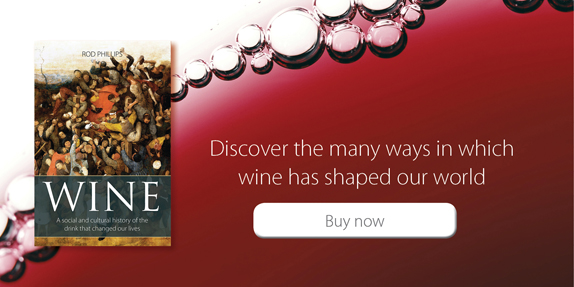War, worship and wanton women – how wine has shaped our world
26 March 2018 by Rebecca in Uncategorized
Wine has been important in many societies since ancient times. It is now produced in all continents and drunk in all but a few countries. It has influenced our health, our political and social relations, our dining habits and even our landscape. To say that wine is a drink that has shaped our world may appear to be an overstatement, but in a new book wine historian Rod Phillips demonstrates just how great a part wine has played in the development of cultures worldwide.
In Wine: A social and cultural history of the drink that changed our lives, Phillips takes a thematic approach to demonstrate how wine has had an impact on eight key areas of our lives. As he says, ‘Wine is a nearly ubiquitous beverage, just like beer and distilled spirits and a little less so than water, tea, and coffee. But it is arguable that the history of wine is that much more complex because of the cultural, social and medical values that have historically been attached to it.’
We may think that concerns about alcohol and health are relatively modern, but the effect wine has on our bodies has long been argued. While Greek and Roman commentators recommended its use in a variety of ailments, and the ancient Egyptians treated complaints as diverse as earache, asthma and jaundice with wine, there have always been those who saw it less as a tonic and more as a danger to health. These days the arguments continue as advocates for wine’s antioxidant effects suggest a few glasses a day are beneficial while some on the opposing side state that anything less than total abstinence poses a threat to health.
In the chapter on wine in relation to women and men Phillips notes a double standard that is perhaps less prevalent today: ‘Historically, men have been anxious about women in possession of alcohol – especially ‘their’ women, meaning their unmarried daughters and their wives,’ he says. ‘Women were advised (by men) to drink alcohol sparingly, if at all, and for the most part women were barred by law or custom from public drinking places such as taverns and alehouses until the twentieth century.’
For men, on the other hand, the ability to hold one’s drink was seen as a sign of manliness. This even extended to an idea, popular until surprisingly recently, that wine would enhance performance in battle. During the First World War French soldiers were given a ration of 1 litre of wine a day, after experiments showed that those who drank wine were more alert and energetic than those given beer. The eventual defeat of the beer-drinking German army did nothing to contradict this view.
Phillips also includes chapters detailing wine’s impact on our landscapes, its sometimes troubled relationship with religion, the increasingly complex interplay between food and wine and some spectacular wine crimes, before taking a revealing look at the way we talk about and criticize wine.
About the author
Rod Phillips is a wine writer who lives in Ottawa, Canada. He is professor of history at Carleton University, where he teaches courses on alcohol, food and European history. He has published in wine media such as The World of Fine Wine, Wine Spectator, Vines Magazine and the guildsomm.com website, and is wine writer for NUVO Magazine. His books on wine include The Wines of Canada (in the Classic Wine Library, 2017), 9000 Years of Wine (2017), French Wine: A History (2016), Alcohol: A History (2014), and A Short History of Wine (2000).

